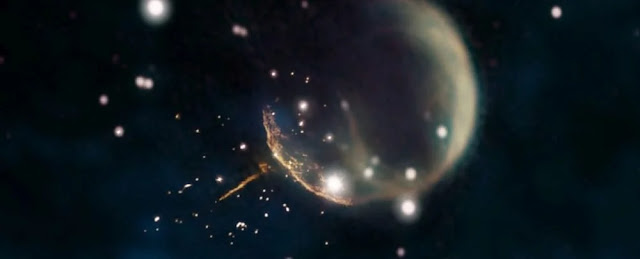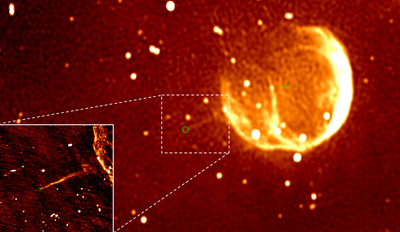A weird star is whizzing through our galaxy at an unimaginable speed. Astronomers discovered PSR J0002+6216, a lone runner speeding across our galaxy at 2.5 million miles per hour, nearly four million kilometers per hour, or 700 miles per second (1,127 kilometers per second).
PSR J0002+6216 travels at a speed of 1,127 kilometers per second, which implies it could reach its destination in less than 6 minutes if it were going from Earth to the moon.
The star was spotted as it flew away from the expanding cloud left by a recent supernova explosion. After punching through the explosion’s outer layer of material, it leaves behind a vast cosmic trail as it travels across the galaxy.
According to astronomers, the tail extends around 13 light-years and is seen pointing back to the supernova center.
PSR J0002+6216 is a pulsar, which is a type of neutron star. A pulsar is a rotating neutron star that emits an electromagnetic radiation beam. These stars have mind-bogglingly fast spin rates, causing them to emit jets of electromagnetic radiation as they spin. This pulsar rotates 8.7 times per second. If the star’s jets of electromagnetic radiation line up with Earth as it spins on its axis through space, we see them as a kind of cosmic lighthouse.
Frank Schinzel, a scientist at the National Radio Astronomy Observatory (NRAO), explains: “Thanks to its narrow dart-like tail and a fortuitous viewing angle, we can trace this pulsar straight back to its birthplace. Further study of this object will help us better understand how these explosions can ‘kick’ neutron stars to such high speed.”
PSR J0002+6216 is situated in the constellation Cassiopeia, around 6,500 light-years from Earth.
According to researchers, the pulsar lies around a light-year away from the core of a supernova remnant known as CTB 1. PSR J0002+6216 was discovered to be moving across the galaxy at a rate five times faster than the typical pulsar speed.
According to astronomers, PSR J0002+6216 is faster than 99 percent of Pulsars with recorded speeds. You can read the research paper here.



